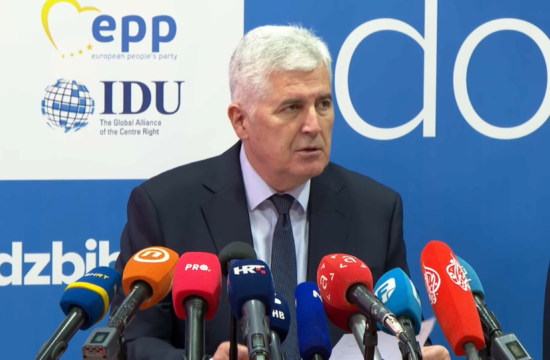
Celebrating January 9 as the ‘Day of Republika Srpska (RS)’ is unconstitutional and represents a crime, the Bosniak member of the country’s tripartite Presidency said on Wednesday about the upcoming event which will be observed in Bosnia’s Serb-majority region.
Sefik Dzaferovic spoke at an international conference named ‘Legal and Political Consequences of the Declaration on the Proclamation of the Republic of the Serb People of Bosnia and Herzegovina on January 9, 1992,’ which is taking place on Wednesday and Thursday with 36 scholars and researchers from the US, UK, Croatia, Australia, Canada, Norway, North Macedonia and Bosnia participating.
The Constitutional Court banned the January 9th celebration of the Day of the RS in 2015, granting an appeal by Bakir Izetbegovic, who was at that time the Bosniak member of the country’s tripartite Presidency. The reason stated was that the celebration falls on the same date as an Orthodox religious holiday, and celebrating it is, therefore, discriminating against the mostly Muslim Bosniaks and the mostly Catholic Croats.
But RS leadership then organised a referendum in the entity at which the predominantly Serb citizens voted in favour of January 9th being the date for the holiday.
Despite the Constitutional Court ruling, the RS Government adopted in 2016 a Law on the holiday which says it will take place on that date.
“The January 9 celebration is an unconstitutional and criminal act. That is the date when the genocide and mass casualties in Bosnia and Herzegovina began. Everyone must face these facts. I call upon institutions to do their job,” Dzaferovic said.
He also spoke about the incidents which took place in several eastern Bosnian towns, including Srebrenica, Orthodox Christmas Eve two days ago.
Several cars passing through the area where the victims of the 1995 Srebrenica genocide are laid to rest as Serb nationalist songs can be heard in the background can be seen in a video which was posted online.
The so-called Ravna Gora movement in Visegrad, an ultranationalist Bosnian Serb group, paraded through the town where Bosnian Serb forces committed mass murder targeting the Bosniak civilian population during the 1992-1995 war. Members of the movement honked their horns and sang nationalist songs targeting Bosniaks.
“The incidents in Visegrad and Potocari show that institutions are not doing their job. This represents, at least, the criminal act of provoking religious hate and intolerance. I call upon the institutions of Bosnia and Herzegovina to respond why they did not react,” Dzaferovic said.
The goal of the international conference is to review the circumstances and anti-constitutional decisions which brought about the destruction and the genocide as well as possible legal and political implications of rulings by international and national courts regarding the issue.
The event was organised by the Institute for Social and Religious Research, the Movement of Mothers of Srebrenica and Zepa Enclaves, the Institute for Research of Genocide Canada, the Tuzla Canton Archives, the Centre for Research of Modern and Contemporary History and the Institute for Research of War Crimes of the Sarajevo University.




